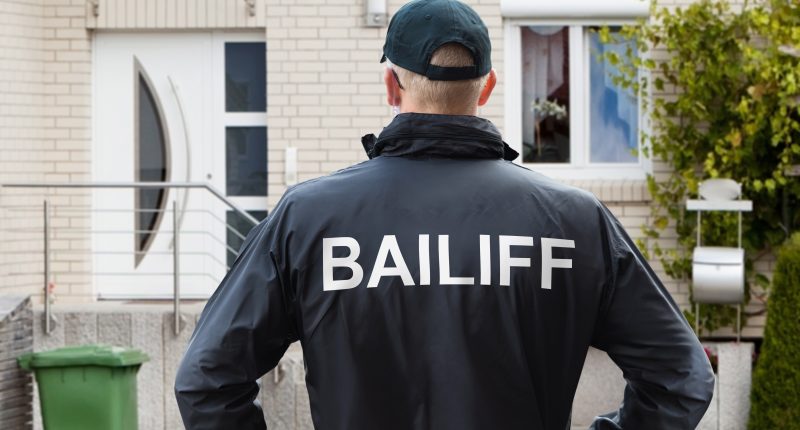IF you’re struggling with debt, you may be feeling anxious at the thought of bailiffs or debt collectors knocking on your door.
Most people use the terms bailiffs and debt collectors interchangeably – but they have important differences.
Debt collectors can’t enter your home and they can’t take goods from you, but bailiffs can as they are appointed by courts, for example.
Maxine McCreadie, a personal finance expert at Creditfix, an organisation that offers free advice to people struggling with debt, said: “Facing the prospect of bailiffs wanting entry to your home can be stressful, but it’s crucial to understand your rights and take appropriate steps to protect yourself.”
“Understanding the differences in their roles, powers, and legal rights can help you respond appropriately to each situation.”
It’s also important to know that no matter who shows up at your door, you do have rights.
READ MORE IN MONEY
We asked Maxine to outline and explain the key differences between bailiffs and debt collectors, and what your rights are in each situation.
ID is the key
If a bailiff or a debt collector turns up at your door, you should ask to see some formal identification.
Not only will this reassure you that the person you are speaking to is legitimate, it will also allow you to tell whether it’s a debt collector or a bailiff at your door.
They do not have to come into your property to do this, they can show you through the window or post it through the letterbox.
Most read in Money
Maxine said: “Legitimate bailiffs should carry identification issued by the court or enforcement agency.
“This ID typically includes a photograph, name, and details about the court or agency they represent – you should always ask to see this identification and verify it before allowing anyone into your home.”
There are also different types of bailiffs, including “certified enforcement agents”, “high court enforcement officers” and “county court and family court bailiffs”.
It should be clear which one they are from their identification.
Debt collectors will also carry ID, but this will be issued by their agency or company, and not issued by the court.
“In this situation,” Maxine said, “you should ask for ID and then verify the debt collector’s credentials before engaging with them.”
“A legitimate debt collection agency will be searchable online and have a valid website.
“They’ll also have a license number so you can verify with the agency.”
They should still follow rules and procedures, including contacting you first and giving you the opportunity to pay what you owe.
Entering your property
Bailiffs and debt collectors have different legal powers when it comes to entering your property.
Bailiffs may have the legal right to enter a home, but they cannot force entry on their first visit.
“This right is usually granted after other attempts to recover the debt have failed,” Maxine said.
“This is why it’s so important not to ignore them, or any letters you are sent.”
Bailiffs have to formally notify you with a “notice of enforcement” letter at least seven days before they can turn up at your property.
If you have been served with this, and the court has given the bailiffs permission, they can force their way in.
While bailiffs are usually appointed by the court to enforce a judgement, they make work independently or for a private bailiff firm.
These typically become involved in the debt recovery process after legal action has been taken and a court judgement has been obtained.
The law says bailiffs can turn up between 6am and 9pm, but outside of these hours is illegal.
And a bailiff must not enter premises if the only people in the house are under 16 or adults who are classed as vulnerable.
Unlike bailiffs, debt collectors have fewer legal powers, Maxine said.
“Debt collectors generally do not have the right to enter a home without permission and can only enter if they are invited in or if they have obtained a court order.
“They usually work for collection agencies or are employed by the original creditor your debt is with, and focus on contacting individuals to arrange payment for outstanding debts.
“They are often involved at an earlier stage, attempting to collect debts before legal action is pursued.”
But Maxine said it’s still important that you address your debts with debt collectors and don’t ignore them.
Seizing possessions
When a bailiff turns up at your house, they are looking to cover the cost of your debt with your possessions.
Your most expensive goods will likely be what the bailiff targets first.
For many people, this will begin with a car.
But bailiffs can’t take all valuable belongings, however.
There are also some goods they are not allowed to take if they are essential for your needs, for example, clothing, bedding, essential furniture and household appliances like ovens, fridges and washing machines.
So you shouldn’t have to worry about these types of goods being removed from your home.
And bailiffs should only take as much as is needed to cover the debt.
Unlike bailiffs, however, debt collectors cannot seize your possessions.
Get help with debt
To not have to face the dreaded knock at the door in the first place, you can get help to clear your debt.
Citizens Advice says it’s important to work out a budget and keep an eye on your bank balance.
Try and pay off more than the minimum on credit cards each month, and pay your most expensive credit card first.
If you’ve got several debts and can’t pay them all, it’s important to prioritise.
Your rent, mortgage, council tax and energy bills should be paid first because the consequences can be more serious if you don’t pay.
Groups like Citizens Advice, StepChange and National Debtline can help you manage your debt and negotiate with your creditors.
You should always have a look at what free options are available for managing debt before you turn to a private firm for support.
There’s also a specific government scheme to help manage debt called Breathing Space, which gives you the right to legal protection from creditors for up to 60 days.
The FCA said consumers can get free and impartial advice from the MoneyHelper website or by telephone on 0800 138 7777.
READ MORE SUN STORIES
Meanwhile, experts have revealed four ways you can clear your debt and those you should avoid.
Plus, here are the six most common questions a debt expert is asked – including what to always pay first.
Do you have a money problem that needs sorting? Get in touch by emailing [email protected].
Plus, you can join our Sun Money Chats and Tips Facebook group to share your tips and stories.










